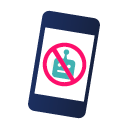
When business is booming and the calls are flooding in, call screening helps filter those calls based on priority and need, making sure essential contacts reach you while blocking unwanted calls.
That’s where the right virtual receptionist solution can save the day. And one of the most overlooked yet useful capabilities of virtual receptionists is call screening.
What is call screening?
Call screening lets businesses take control of their phone lines—filtering and directing incoming calls, prioritizing the ones that matter most, and blocking annoying spam. It’s a game-changer for saving time, boosting customer service, capturing leads, and staying focused without unwanted interruptions.
Sometimes the screening process takes a few moments before an appropriate decision can be made.
The screener has to listen long enough (and perhaps ask enough questions) to determine:
- Is the call an unwanted sale pitch or a time-wasting robocall?
- Is the call relevant to your business?
- If so, who should it be routed to (and are they available)?
- If not, how do you politely break free and ensure the caller doesn’t call back? In the case of repeated unwanted callers, it may be worth the time to block those phone numbers!
Many of us engage in call screening all the time, even if we don’t realize it. If you answer calls from numbers you don’t recognize—or if you’re suddenly unavailable whenever you see a certain family member trying to reach you—you’re screening your calls.
But it’s a little (or a lot) trickier when it’s for a business. For one, who’s going to do all this screening? You, if you’re a one-person shop, such as a solo attorney office. Or maybe an equally busy team member you delegated the cumbersome chore to!
Of course, if you have the financial resources to spare, an in-house receptionist or assistant will do nicely. But if you’re looking to stay lean and avoid unnecessary costs, we suggest using virtual receptionists who can expertly handle and automatically screen your incoming calls.
Why does a business need call screening?
There’s also the fact that businesses can’t really afford to simply ignore unknown callers or avoid certain numbers. After all, that unfamiliar number can be an opportunity to connect with a new customer or client. And that person who bugs you a bit too often could spread negative word of mouth if you don’t communicate with them the way they want.
That said, not every call is worth your time. It’s easy to see how a few unwanted calls can add up to a ton of lost productivity. Each time you or one of your workers gets thrown off-track because of a nonessential call, it takes several minutes to regain focus on the task at hand. That’s where Ruby’s virtual receptionist call screening can help!
Time management
When implemented correctly, virtual receptionists save your business time, energy, and money by screening calls and filtering out nonessential ones, while directing important calls to the right team member. By prioritizing key calls, call screening minimizes distractions, boosts productivity, and allows your team to focus on what really matters.
Blocking spam and robocalls
Spam, telemarketing, and robocalls are common interruptions that drain time and disrupt workflow. Call screening filters out these unwanted calls, so only real and relevant callers make it through. With fewer distractions, your business can stay focused, boost productivity, and keep communication running smoothly.
Improved customer service
It really never hurts to boost client satisfaction. Call screening significantly improves customer service by ensuring that important calls are quickly directed to the right person. With virtual receptionists managing call flow, businesses can maintain great communication, so clients get the attention they deserve without unnecessary delays.
Call routing
Make sure every call lands in the right hands with call routing. Not only does the right person get the message, but it speeds up response times, cuts down on confusion, and keeps customers happy.
Privacy protection
Call screening acts like a security guard for your business, letting only pre-screened calls through to protect the personal info of owners and staff. This privacy shield cuts down on unwanted interruptions, so decision-makers can focus on what really matters.
Lead prioritization
Who wouldn’t love more clients? Call screening plays a key role in lead prioritization by quickly identifying and directing calls from potential leads to the appropriate team members. This swift response can significantly enhance the chances of converting leads into customers, driving increased sales and growth opportunities.
Reduced stress
Take a deep breath and relax; call screening has your back. Significantly reduce stress in the workplace by eliminating unwanted calls and filtering out distractions. This improved focus not only enhances productivity but also fosters a more positive work environment, allowing team members to feel less overwhelmed.
After-hours management
Manage after-hours calls by filtering or redirecting them based on urgency. This way critical calls are always addressed, no matter what time of day (or night).
Resource allocation
Some calls need a little extra expertise, and call screening makes sure they go straight to the right team member. This smart approach saves time and resources by routing every call to the correct person or department.
Scalability
As businesses grow, call volumes can skyrocket, but call screening makes it a walk in the park. It filters and prioritizes calls, so your team can stay focused on what really matters. With smoother operations and top-tier customer interactions, businesses can scale up without losing that personal touch.
How call screening works
Your business can’t afford to screen out calls that matter, so it’s important to pick a call handling service provider you trust. At Ruby, we tailor the approach to call screening based on your needs, taking into consideration variables such as your business industry, number of staff, location, customer base, and technological capabilities.
When appropriate, we can leverage our high-tech automated call filtering based on the parameters our partners provide. Just give us your list of calls to automatically route, transfer, or block, share any additional criteria, and let us do the rest.
Step 1: incoming call detection
When a call comes in, Ruby’s automatic call screening system intercepts it before it reaches the intended recipient.
Step 2: caller identification
The system uses various data points, such as Caller ID and integration with CRM systems, to identify the caller.
Step 3: call assessment
Ruby’s system assesses whether the call is from a known contact, a potential lead, or an unknown/blocked number. By using a pre-set list of criteria, it can flag spam or unwanted screen calls automatically.
Step 4: screening options for the recipient
If the caller is unknown, the system might prompt the caller to state their name or purpose for calling. The recipient is notified about the call with details, including Caller ID and the caller’s name or a recorded message. They are then presented with options to answer the call, reject it, or send it to voicemail.
Depending on the recipient’s choice, the call can be routed in several ways:
Answer: the recipient answers the call directly, ideal for urgent matters

Voicemail: if the recipient is unavailable or prefers not to take the call, it is sent to voicemail for review
Redirect/Forward: the call can be forwarded to a more appropriate recipient or specialized team that can handle the inquiry

Block: the system can block spam or flagged calls, either automatically or manually
Step 5: automated responses
If the recipient is unavailable, Ruby’s system can provide a pre-recorded message or request additional information from the caller. This feature ensures that callers receive a prompt response even when the intended recipient cannot take the call.
Step 6: post-call management
After screening, the system logs important details like time, caller information, and the outcome of the call. This logging process enhances reporting capabilities and improves future call handling by tracking patterns and outcomes.
How to choose a call screening service
Choosing the right call screening service can feel like a big decision, but it doesn’t have to be complicated. Whether you’re looking to block spam, prioritize leads, or integrate with your CRM, the perfect service is out there (or right here).
So, let’s get into how to pick the best call screening service for you and your business.
Business needs
Figure out what your business needs—whether it’s blocking spam, routing calls like a pro, prioritizing leads, or syncing up with customer support.
Features offered
Look for must-have features like spam blocking, CRM integration, after-hours management, caller identification, and reporting tools.
Ease of use
Ensure the service is easy to set up and manage. Look for intuitive user interfaces, simple dashboards, and clear call handling processes that won’t leave you scratching your head.
Scalability
Pick a provider who’s in it for the long run. Look for flexible plans that can handle more calls as your business takes off, without missing a beat.
Integration with existing systems
Skip the headaches and make sure the service plays nice with your current phone system, CRM, or other tools you’re already using.
Customer support
Opt for a provider with responsive and accessible customer support. Check out their hours, support channels (phone, chat, email), and how quickly they solve problems—because nobody has time for waiting.
Pricing and plans
Compare the cost of services, including subscription models, additional fees, or custom plans. Check if the pricing aligns with your budget and includes the features you need.
Reputation and reviews
Check out what others are saying. Read customer reviews and testimonials to get the scoop on reliability, service quality, and how well they handle call screening.
Security and privacy
Make sure the service has top-notch security to keep your business and customer data safe and sound.
Trial period or demo
Lots of call screening companies offer free trials or demos—so you can take them for a spin and see how well the service clicks with your business before diving in.
How call screening can help your business
“When we first launched our music entertainment agency, my team and I were drowning in calls. Half were spam-persistent venue vendors, equipment suppliers, even a guy trying to sell us alpaca mascots for ‘stage flair.’
We missed a critical call from a panicked bride whose band canceled last minute because we were too busy sifting through robocalls. Enter call screening. Now, our system flags priority clients using keywords like ‘wedding emergency’ or ‘corporate gala.’
Last month, a hotel manager named Marcus called at 9pm—flagged as urgent. His headline act for a luxury product launch had food poisoning. We pulled strings to book a jazz quartet within the hour. Marcus later told us the event’s success hinged on that quick fix—they rebooked us for three more events.
Spam? Down 70%. Our coordinator, once juggling 40+ irrelevant calls daily, now focuses on tailoring setlists and negotiating with artists. Last quarter, we booked 22% more events because we’re not stuck fielding cold calls about alpacas.
It’s like having a backstage pass to what matters—real clients, real crises, real music magic.”
– Sally Johnson, Owner, Green Light Booking, LLC

Small businesses
Save time and resources by avoiding unwanted calls.

Large businesses
Improve customer service with optimized call routing and prioritization for a more tailored experience.
Sales teams
Prioritize leads and minimize distractions from cold calls for a more focused approach.
Support teams
Boost customer satisfaction with quicker response times by streamlining call management and avoiding bottlenecks.
Customer testimonial
“Since we started using Ruby for our sales calls, our team has been able to focus completely on high-quality leads without the constant interruptions from spam and robocalls. Ruby’s automatic call screening blocks unwanted calls and lets only the right ones through, so our team can give their attention to real prospects. It’s been a huge boost in productivity, and we’re seeing more conversions because of it!”
Sales Manager
Why choose Ruby?
Ruby offers a comprehensive call screening solution designed to support growing businesses. With seamless integration into existing systems, it ensures smooth operations while focusing on ease of use and security. Ruby provides responsive customer support, flexible pricing, and reliable data protection, making it a practical choice for businesses looking to streamline call management and stay organized.
FAQs
While the call screening feature can significantly reduce spam calls by filtering out unknown or suspicious numbers, it may not block all unwanted calls. Combining call screening with spam-blocking features can help minimize disruptions.
No, call screening ensures that important calls are prioritized and routed to the appropriate team members. Critical calls are never missed, and you can still customize how each call is handled based on its urgency.
Call screening services are designed to integrate your current phone system seamlessly with the phone app, whether through VoIP, mobile devices, or traditional landlines. This ensures minimal disruption and a smooth transition.
Yes, most call screening services allow you to fully customize how calls are handled—whether to block spam, forward calls, or prioritize certain types of mailing. You can set specific rules to fit your business needs.
Absolutely! Call screening is a valuable tool for small businesses, helping to save time by filtering out unwanted calls and allowing you to focus on engaging with customers and growing your business.



